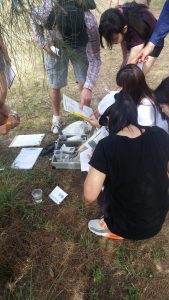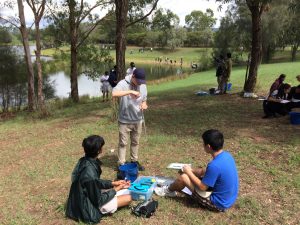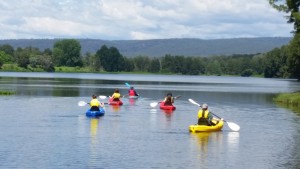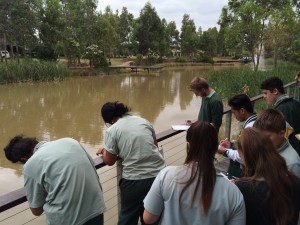Stage 6 Programs
This Excursion can be used as a model for a DEPTH STUDY (5 Hours) Note: This excursion can be combined with Investigating Science. Focus – ‘Ecosystem Dynamics’ – Population Dynamics Outcomes: *BIO 11-11 *BIO 11-3 *BIO 11-4. *BIO 11-5 By working scientifically students investigate the key question of: ‘How healthy is the Penrith Lakes ecosystem? Activities include: Introduction to Penrith Lakes and the investigation site, instruction on using abiotic equipment, biotic and abiotic data collection, evaluation and conclusions related to the key question. Inquiry questions :
This excursion can be used as a model for a DEPTH STUDY (5 hours). Note: This excursion can be combined with Biology. Outcomes: *INS 11-1 *INS 11-2 *INS 11-3 *INS 11-5 Students conduct a collaborative practical investigation into water quality and collect a range of qualitative and quantitative primary data from Penrith Lakes. The basic inquiry question is:
This Excursion can be used as a model for a DEPTH STUDY (5 Hours) Focus – ‘Human Impacts’- Introduced Species – An Investigation in a Kayak Outcomes: *EES 11-1 *EES 11-2 *EES 11-3 *EES 11-11 This program involves a canoe paddle on the Nepean River or at Penrith Lakes. Student numbers are limited to 16 as set down in DET guidelines. ** If you have more the 16 students please refer to our Human Impacts – Water Management/Intro Species Program** Focus – Earth’s Natural Systems Outcomes: *GE-11-01, *GE-11-02, *GE -11-05, *GE -11-06 , *GE-11-07 , *GE-11-08 , *GE-11-09 The new Year 11 syllabus commencing in 2024 emphasises the importance of fieldwork and will contribute 4.5 hours of mandatory fieldwork in Year 11. ‘Fieldwork is an integral and mandatory part of the study of Geography. It enables an understanding of geographical processes and geographical inquiry. Fieldwork should be an enjoyable experience that enhances learning opportunities for all students because it provides for a variety of teaching and learning approaches. The experience of active engagement in fieldwork helps to create and nurture a lifelong interest in, and enthusiasm for the world in which students live.’ The program formulates geographical questions for investigation. Geographic inquiry address three main questions: What is it? Where is it? Why is it there? A fourth question has been suggested in recent times: Why care? This relates to sustainability concerns. With this new program students: Human Impacts – Water Management/Introduced Species | Stage 6 | Earth and Environmental Science This Excursion can also be used as a model for a DEPTH STUDY (5 Hours) Focus – ‘Human Impacts’ – Water Management and Introduced Species Outcomes: *EES 11-1 *EES 11-2 *EES 11-3 *EES 11-11 Students do not have to be ‘on the water’ and caters for larger class sizes. Activities include : Introduction to stormwater at Penrith Lakes, water testing in the catchment and at Penrith Lakes, a water management walk incorporating bird observation, aquatic invertebrate study to identify an introduced species (Gambusia). A concluding session covers human impacts on water quality and quantity (blue green algae), affects on the ecosystem of an introduced species and the local extinction of a native species at Penrith Lakes.
Evaluations and conclusions involve a discussion of human impacts at Penrith Lakes and a recent local extinction event.
‘What effect can one species have on another species in a community?’
‘How can human activity impact on an ecosystem?’ are explored.
Students make inferences and conclusions derived from the primary data. It tests the hypothesis that the water quality at Penrith is suitable for the recreation activities currently operating and proposed in the future.
‘What inferences can be drawn from observations?’
The program focuses on the introduced aquatic plant, Salvinia. Through primary research, students discover how introduced species affect ecosystems.







